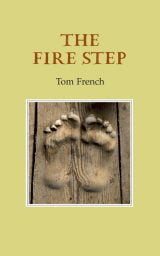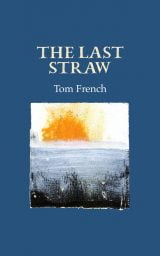Be they delicate couplets, which have become a signature form, or the extended narratives at which he is adept, Tom French’s poems are immediately recognisable as his and his only. Self-questioning in his search for identity, the quiet reflective tones of much of the poems in The Way to Work are offset by his ‘1916’ which, a century on, is generous in the options it offers the reader. Tom French’s poetry continues to win admirers, at home and further afield.
Deceptively simple and straightforward, The Way to Work weaves family memories and recollections seamlessly with wider histories. From his tender imaginings of an outdoor nativity or his record of a christening to his evocations of war and its pity (in particular World War I and Ireland’s War of Independence), his reports are honest and convincing, his gaze unflinching. Local idioms feature prominently. People’s names, place names, field names and nicknames recur. There are elegies for musicians; tunes abound.
‘Tom French’s fourth book, The Way to Work is a rapid, weighty follow-up to 2014’s Midnightstown and shows all his customary skill with line and sentence, sound and tone. French is a librarian as well as a poet, and it is easy to see why these roles so often fit together as his poems collect objects as memorials to a person or place or way of life. The contemporary elegiac mode is marked by fealty to local people and places, rather than heroic deeds, but a poem lives when, additionally, it snags a reader’s memory. French’s craft generates air and lift-off as he arranges and sets his material.’ — John McAuliffe, The Irish Times
Tom French’s fourth book, The Way to Work (Gallery €12.50pb; €18.50hb), is a rapid, weighty follow-up to 2014’s Midnightstown and shows all his customary skill with line and sentence, sound and tone. French is a librarian as well as a poet, and it is easy to see why these roles so often fit together as his poems collect objects as memorials to a person or place or way of life.
The contemporary elegiac mode is marked by fealty to local people and places, rather than heroic deeds, but a poem lives when, additionally, it snags a reader’s memory. French’s craft generates air and lift-off as he arranges and sets his material: unexpected music emerges as The Sixth of March observes
snowdrops melting; clay opened, loosened, let
breathe; moss peat bearing the marks of the rake,
and a woman walking to the compost bin,
her greeting encompassing God and spring.
The book is structured around a series of poems about a family swim (‘The Neptune Pool’) and another series about Francis Ledwidge’s home place, Janeville. These lyrics engage the domestic and historical poles of French’s imagination, while there are also several terrific meditative poems, such as ‘East’, the title poem and ‘The Fathers Raising the Nets for the Last Game of the Season: A Triptych’. And he is unencumbered by any pieties when he approaches the Rising: ‘1916’ is a state-of-the-nation poem which lets no one off the hook as it imagines the centenary as an automated phone call, with readers offered 16 different options, among them:
If you would like to watch a selection of Star Wars characters
deliver the line “a sustained engagement with our cultural heritage”
in your first language into the teeth of a Force 10 gale
on Skellig Michael, please press 5 now.
— John McAuliffe, The Irish Times
Patrick Kavanagh said that, ‘to know fully even one field or one land is a lifetime’s experience.’ In Tom French’s fourth collection from Ireland’s Gallery Press, The Way to Work, the poet homes in (I use the verb advisedly) on a way of life in rural Ireland, that seems almost familiar, to both poet and reader, even as it is slowly disappearing.
The sense of reading something familiar also comes from any reading, however cursory, of the Irish poetry of the last 60 years, whether the monuments of Mahon, Heaney, and Longley, to Paulin, O’Donoghue, O’Driscoll et al, as well as the particularly Irish tropes – of history and history memorialized, that these and other poets riff upon (this collection, published in the centenary year of ‘The Rising’, features as a coda, an uncharacteristic, but excoriatingly savage and sardonic poem of French’s, called ‘1916’ – worth the price of the collection alone).
But French reminds us that 1916 was also the centenary of the Battle of the Somme, where it may be forgotten by Englanders that many Irish young men died pointlessly (as well as yes, English, and Welsh, Scots, Indians, Canadians and so on.)
Those young soldiers were victims of that quintessentially Irish subject-matter – the fact, elevated almost to mythic status – of diaspora, departures, leavings, osmosis into and from other cultures and societal norms; of spread compass points (French’s titles include, ‘North of the Village’; ‘East’; ‘West’; ‘From Home’; ‘Beyond Carrigart’); a sense of Place, both found and lost; of gaining and losing bearings; and always, the trope of naming.
In ‘Among the Stones’, the poet is observing a sculpture in the National Gallery of Ireland. Art itself, including by implication, poetry, becomes a kind of ‘naming’ or ‘possession-ing’, a re-visioning of things. To delineate and describe is to ‘make known something.’ Places are brought into being, made ‘real’, by their naming, in the litany-like 9 line middle section of the first stanza of the poem, where centre-justified on the page, there is just a list of places, woven musically together: ‘Derryquin/Ballinvoher/ Martraman/Lisselane.’ It is this almost mystical association with the naming of places in the land, that is so characteristic of the island’s poetry (an historical-cultural facet Derek Mahon himself has written extensively about.) In ‘Calgary,’ about a family shot-gun suicide, the prayer they may say for him is almost an incantation of ‘the names of fields he knew and never said – …Pairc Glas. The Lios Field. Pairc na Coillte/The Furze Brake…’ and so on for a further two lines to near the end the stanza.
Other than to the Somme, French rarely departs in subject-matter from scenes of this much-loved purlieu of a lush but harsh Irish farming community life, even if the ‘the dung spreader’ is now ‘manacled/by brambles in the haggard,’ and the path to the village is a ‘strip of high ground/where spring grass gets it hard to grow.’ (‘North of the Village.’)
Paradoxically, when he does venture afield, as in ‘A Glass of Tea’, with its chilling democrat Barack Obama quote – ‘We did whole lot of things that were right, but we tortured some folks,’ French’s gentle lyricism and simplicity of line seem all the more powerful for his understated, elliptical, ironic approach:
He dreams of drinking with his torturers.
They have learned so much from one another.
Because they are his guests and he’s their host
he takes great pains to welcome them.
In other hands, the obvious double-entendres of tortured and torturer learning from each other, and the victim making ‘great pains’ to welcome his tormentors could seem forced, but the very genteelness of French’s banale contextualising of a visit from torturers as a meeting over tea, is striking, and makes the reader both queasy and uneasy, as we surely should be.
French, a poetry multi-award winner and professional librarian, clearly contextualises his work in the ‘field’ of his chosen vocations. ‘The Hare’ is a poem about a car hitting, or a close encounter, with a wild animal, itself a trope of US poetry since at least William E. Stafford’s, ‘Travelling in the Dark’ or Bishop’s ‘The Moose’ (and which has also been transmigrated to Scotland by John Burnside). I find it a worthy addition to this canon: the ‘matter-of-factness’ and tenderness, its very pared-back ‘slightness’ (as with a hare compared to a ton of car), lends extra ‘weight’ to the pathos, where the driver, ‘bore him across our road/for the scavengers, supporting…like a newborn’s, his body/in my hands – the head, the neck.’ With French’s delicate handling of words, their heft, we feel and see that snapped neck lolling, sacred, mythical, but road-kill.
— Ken Evans, The Manchester Review




